
Eastern Visayas
The Inflation Rate (IR) for the bottom 30% income households in Eastern Visayas declined to 4.5 percent in August 2024 after two (2) consecutive months of acceleration. This brings the average inflation rate from January to August 2024 for this income group to 5.0 percent. Moreover, the regional IR for the bottom 30% income household was lower than the 4.7 percent national IR for the same income group in August 2024. In August 2023, the inflation rate was posted at 3.8 percent. (Tables 1 and 2).
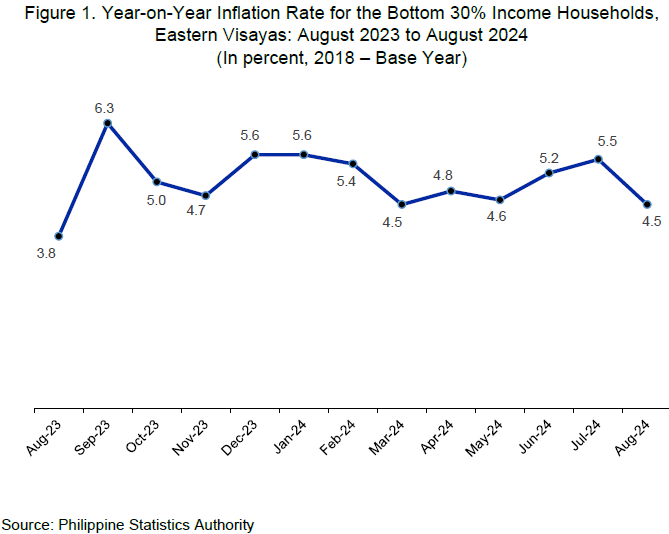
Main Drivers of the Upward Trend of the Regional Inflation
The main driver of the downtrend of the regional inflation for the bottom 30% income households in August 2024 was the lower IR in the heavily weighted food and non-alcoholic beverages at 6.6 percent from 8.2 percent in the previous month. This was followed by the annual price decrease of transport commodity group at 1.4 percent in August 2024 from 2.0 percent IR in July 2024. In addition, restaurants and accommodation services registered lower IR at 2.8 percent during the month from 3.9 percent IR in July 2024.
Moreover, lower IRs were noted in the indices of the following commodity groups during the month:
a. Personal care, and miscellaneous goods and services, 1.8 percent from 2.0 percent;
b. Alcoholic beverages and tobacco, 2.4 percent from 2.6 percent;
c. Education services, 11.8 percent from 13.7 percent;
d. Health, 1.7 percent from 2.0 percent;
e. Furnishings, household equipment and routine household maintenance, 2.3 percent from 2.4 percent; and
f. Clothing and footwear, 0.8 percent from 0.9 percent.
On the other hand, housing, water, electricity, gas and other fuels commodity group and recreation, sport and culture commodity group recorded higher IRs in August 2024 at 1.1 percent and 4.7 percent from 0.6 percent and 4.3 percent in July 2024, respectively.
Information and communication retained its previous month’s IR at 0.2 percent, while financial services maintained its 0.1 percent annual price decrease in July 2024.
Main Contributors to the Regional Inflation
The top three commodity groups that contributed to the August 2024 regional IR for the bottom 30% income households were the following:
a. Food and non – alcoholic beverages with 87.7 percent share or 4.0 percentage points;
b. Housing, water, electricity, gas and other fuels with 3.7 percent share or 0.2 percentage point; and
c. Restaurants and accommodation services, with 2.6 percent share or 0.1 percentage point.
Food Inflation
Food inflation for the bottom 30% income households in Eastern Visayas decreased to 6.9 percent in August 2024 from 8.6 percent in the previous month. In August 2023, food inflation was posted at 6.0 percent (Table 3).
The decline of food inflation was primarily due to the slower IR observed in rice at 17.5 percent during the month from 21.0 percent in July 2024. The faster annual price decrease of fish and other seafood at 3.7 percent in August 2024 from 2.0 percent annual price decrease last month likewise contributed to the downtrend of the food IR. Vegetables, tubers, plantains, cooking bananas and pulses recorded lower IR at 2.9 percent in August 2024 from 3.7 percent in July 2024.
In addition, lower IRs were observed in the following food groups:
a. Fruits and nuts, 13.2 percent from 14.8 percent;
b. Milk, other dairy products and eggs, 3.8 percent from 4.3 percent;
c. Ready-made food and other food products not elsewhere classified, 7.8 percent from 8.0 percent;
d. Corn, 3.1 percent from 3.9 percent; and
e. Flour, bread and other bakery products, pasta products, and other cereals, 2.0 percent from 2.1 percent.
Moreover, sugar, confectionery and desserts continued to register annual price decline at a faster rate of 4.1 percent in August 2024 from 3.1 percent annual price decline in July 2024.
In contrast, meat and other parts of slaughtered animals registered faster IR at 1.5 percent in August 2024 from 1.4 percent in July 2024. Meanwhile, oils and fats recorded a slower annual price decrease at 1.2 percent in August 2024 from an annual price decrease of 1.3 percent in July 2024.
Main Contributors to the Food Inflation
Food inflation shared 86.1 percent or 3.9 percentage points to the regional inflation for the bottom 30% income household in August 2024. The food groups with the highest contribution to the food inflation during the month were the following:
a. Cereals and cereal products, which includes rice, corn, flour, bread and other bakery products, pasta products, and other cereals, with 92.8 percent share or 6.4 percentage points;
b. Fruits and nuts, with 5.3 percent share or 0.4 percentage point; and
c. Ready-made food and other food products not elsewhere classified, with 3.3 percent share or 0.2 percentage point.
Inflation Rate by Region
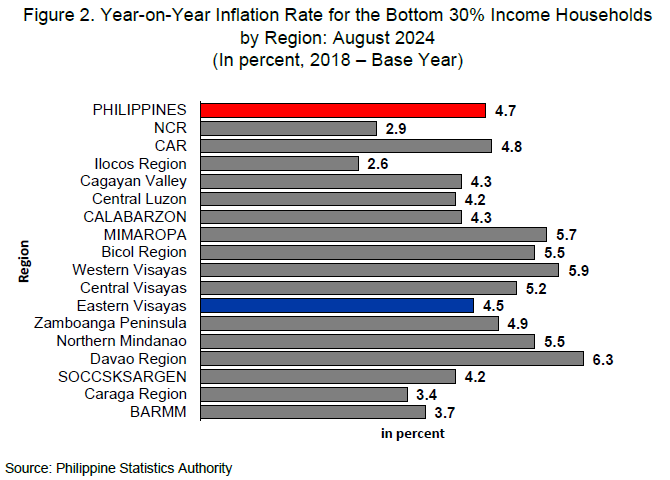
In comparison to their IRs in July 2024, 15 regions registered lower IRs for the bottom 30% income households in August 2024 and two (2) regions registered higher IRs. Eastern Visayas’ IR for the bottom 30% income household at 4.5 percent ranked seventh among the regions with low IR during the month in review. In August 2024, the highest IR for this income group was recorded in Davao Region at 6.3 percent, while the lowest IR was observed in Ilocos Region at 2.6 percent. (Figure 2 and Table 4)
Inflation Rate by Province

Relative to their IRs for the bottom 30% income households in July 2024, all of the provinces recorded lower IRs in August 2024. Meanwhile, the lone Highly Urbanized City (HUC), Tacloban City, retained its previous month’s IR at 5.1 percent. For this income group, Biliran registered the highest IR among the provinces at 6.1 percent. This was followed by Leyte at 5.7 percent, Southern Leyte at 4.8 percent, Eastern Samar at 3.5 percent, and Northern Samar at 3.2 percent. The lowest IR for this income group was noted in Samar at 2.7 percent. (Figure 3 and Table 5).
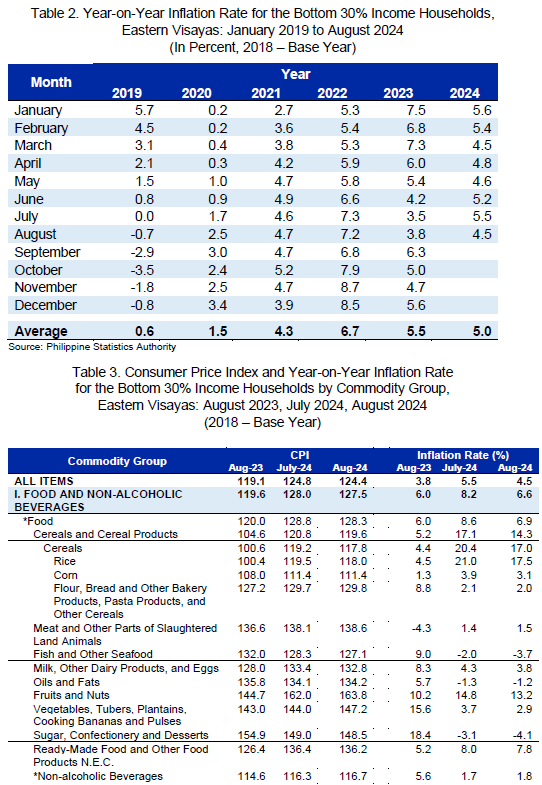
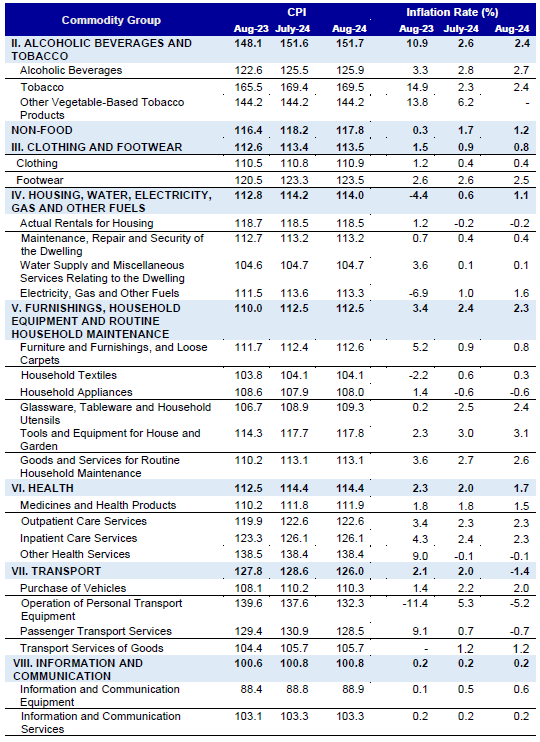
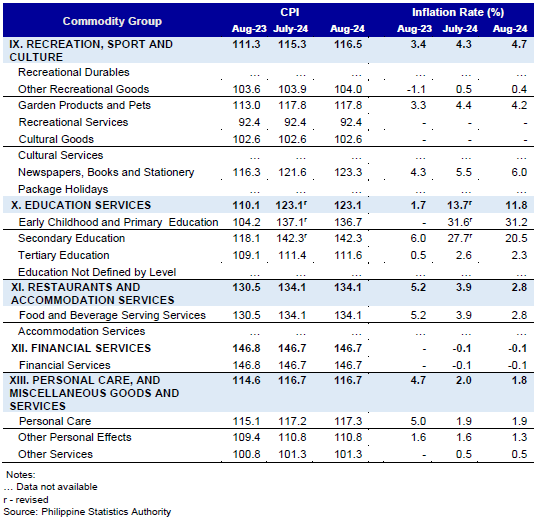
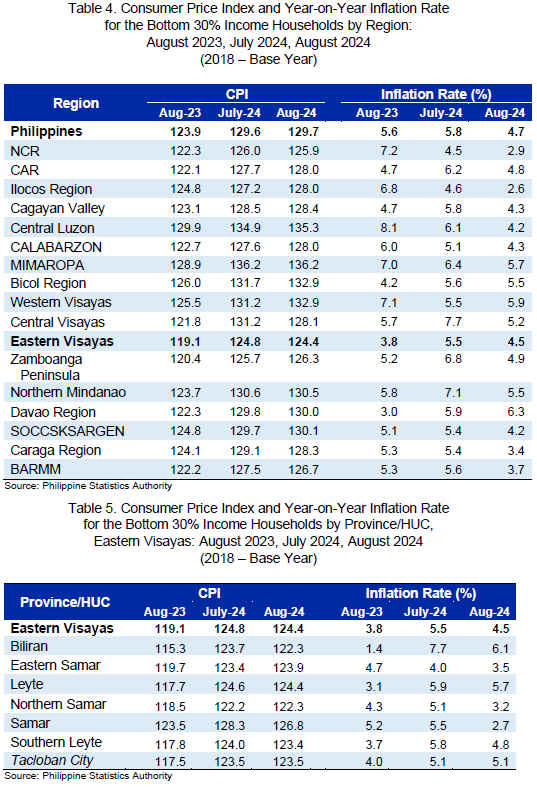
TECHNICAL NOTES
The current CPI series is 2018-based. The rebasing to 2018 is the 12th base period and 11th rebasing for CPI. The five steps involved in the rebasing/computing of CPI are as follows: (1) identification of the base year (2) determination of the market basket (3) determination of household consumption patterns/weights (4) monitoring of prices of items in the basket and (5) computation of CPI.
The 2018-based CPI series uses the same method of computation as the 2012-based CPI series, which is chained Laspeyres formula.
BASE YEAR - is a period at which the index number is set to 100. It is the reference point of the index number series. The CPI is rebased from 2012 to 2018.
CONSUMER PRICE INDEX (CPI) - is an indicator of the change in the average prices of a fixed basket of goods and services commonly purchased by households relative to a base year.
DEFLATION - is the decline in prices for goods and services that happens when the inflation rate dips below zero percent.
INFLATION RATE (IR) - is the annual rate of change or the year-on-year changes in CPI. It indicates how fast or how slow price changes over two time periods (year-on-year). Contrary to common knowledge, low inflation does not necessarily connote that prices of commodities are falling. It means that prices continue to increase but at a slower rate.
MARKET BASKET - refers to a sample of goods and services commonly purchased by the households. The market basket for CPI was updated using the results of the 2021 Survey of Key Informants (SKI). The commodities included in the 2018-based CPI market basket were the modal commodities which were considered as the most commonly purchased/availed commodities by the households. The commodities in the 2018-based CPI market basket were grouped/classified according to the 2020 Philippine Classification of Individual Consumption According to Purpose (PCOICOP).
MONITORING OF PRICES - involves establishing baseline information for the prices of the items in the base year and monitoring the prices of the items on a regular basis. Data collection for the CPI is done by the provincial office twice a month, except for petroleum products which are monitored on a weekly basis, every Friday. First collection phase is done during the first five days of the month while the second phase is on the 15th to 17th day of the month.
PURCHASING POWER OF PESO (PPP) - gives an indication of the real value of peso (how much it is worth) in a given period relative to its value in the base period. It is computed as the reciprocal of CPI multiplied by 100.
RETAIL PRICE - refers to the actual price at which retailers sell a commodity on spot or earliest delivery, usually in small quantities for consumption and not for resale. It is confined to transactions on cash basis in the free market and excludes underground prices and prices of commodities that are on sale as in summer sales, anniversary sales, Christmas sales, etc.
WEIGHTS - is a value attached to a commodity or group of commodities to indicate the relative importance of that commodity or group of commodities in the market basket. The weights for the 2018-based CPI were derived from the expenditure data of the 2018 Family Income and Expenditure Survey (FIES). The weight for each commodity/group of commodities is the proportion of the expenditure commodity/group of commodities to the total national expenditure. The sum of the weights of the commodity groups at the national level is equal to 100.
Sgd. WILMA A. PERANTE
Regional Director

